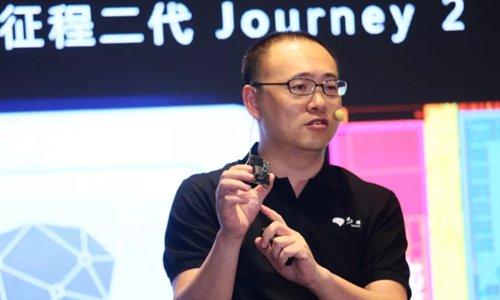
Yu Kai, founder and CEO of Horizon Robotics, launches Journey 2 automotive-grade artificial intelligence chip at the 2019 World Artificial Intelligence Conference in Shanghai on Friday. (Photo: Courtesy of Horizon Robotics)
China's first automotive-grade artificial intelligence (AI) chip, called Journey 2, has been put into mass production, domestic autonomous driving solution provider Horizon Robotics announced at the 2019 World Artificial Intelligence Conference (WAIC), making an early bid for a stronger position in the promising market.
Based on the AI chipmaker's proprietary Brain Processing Unit 2.0 (BPU 2.0) processor architecture, the Journey 2.0 can efficiently handle a variety of AI tasks, like accurately recognizing and detecting different objects in real time, according to a press release Horizon Robotics sent to the Global Times.
The new chip is highly energy efficient and can offer a computing performance of more than 4 Theoretical Operations Per Second (TOPS) at a typical power dissipation of only 2 watt, according to the press release.
The Beijing-based start-up also unveiled Horizon Open Explorer, an open tool chain for developers, at the launch of the Journey 2 at the 2019 WAIC in Shanghai on Friday. Users of the Journey 2 will be offered an open basic development environment that covers solutions for reference, sensing results, chips and tool chains, the press release read.
Journey 2 has been ordered by several car manufacturers in five countries, Horizon, which is seen as China's future Intel in the AI sector by some industry insiders, told the Global Times on Sunday.
Horizon has taken the lead in launching an automotive-grade AI chip, but it's still under great competitive pressure, an industry insider told the Global Times on Sunday.
The autonomous-driving sector involves a huge industry chain including automakers, hardware and software producers and network providers. Its development is still at the beginning stage, and it's still too early to tell which chip producer will gain ground, said Feng Shiming, a veteran car industry analyst.
Following the Journey 2, the BPU 3.0-based Journey 3 chip is expected to be launched next year, said Wu Zheng, general manager of Horizon's Shanghai chip research and development hub.
The Journey 3 will perform better than Mobileye's automotive-grade chip, which is now used by most vehicle makers, an anonymous employee from Horizon told the Global Times on Sunday.
As technology giants like Huawei plan to launch their own automotive-grade AI chips this year and cars using the Harmony operating system will also be launched soon, China's autonomous driving solution providers are expected to catch up with and surpass their overseas competitors, Xiang Ligang, director-general of the Beijing-based Information Consumption Alliance, told the Global Times.


